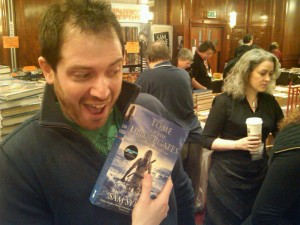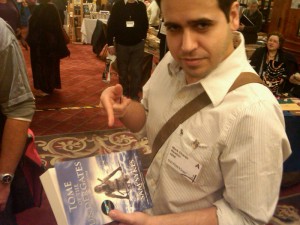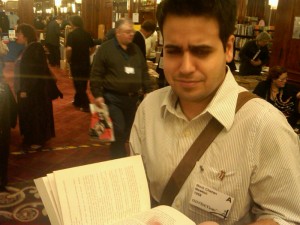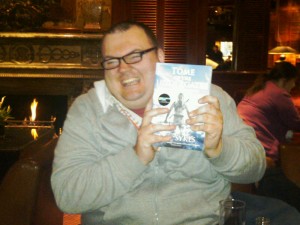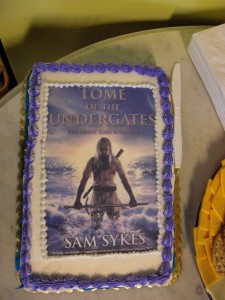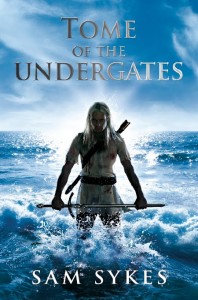Voices of the Dead
I’m not a man that holds a grudge against someone for their opinion. I don’t get upset if someone gets something out of Tome of the Undergates that I didn’t intend them to. That’s part of the allure of writing. I don’t get upset if someone doesn’t like the book, either; any piece of art is going to be subjective and not every piece is for everybody. Criticism, too, can be useful to a writer. Assuming it’s presented in a way that an author can actually look at without emotionally ripping himself apart, a lot of writers benefit from eloquent, exemplified discussions of where they can improve on.
This doesn’t apply exclusively to Tome of the Undergates, either. A lot of writers improve greatly when their work is scrutinized. When we have a problem is when the criticism is not helpful. While browsing a few of my fellow authors’ critiques, I happened to notice a rather disturbing trend in the commentary. Namely, that a lot of the criticism boiled down to the following statement:
“He’s not George R.R. Martin/Joe Abercrombie/Gene Wolfe/China Mieville.”
This sort of commentary got me thinking. A standard complaint leveled against fantasy and its readers is that every book is the same: it’s the same story of good and evil, the same characters of hero and villain, the same format of questing for good times, the same result of saving the world. This is a view I patently reject: as I discussed over at Pat’s Fantasy Hotlist last week, I think readers and authors alike have come to the point where we not only can accept different stories, we demand them. As such, you’re quite unlike to read two fantasy stories that are like each other. The genre has benefited from this.
At the same time, however, a different kind of demand has come up, and I think it’s not doing any of us a lick of good.
We compare authors all the time; hell, my publishers do it for me. It’s the easiest way to summarize an author and to get another person interested in their book or to explain that said book just isn’t for them. To say “Author A is like/similar/evokes feelings of Author B” is a fine and apt thing to say…so long as it stops there and is taken as no more than that: a suggestion that Author A might have a style similar to Author B. Where the danger comes in is when this is taken too literally, when the major complaint becomes someone feeling betrayed because, no matter how alike they might seem, Author A is not Author B.
George R.R. Martin is a unique voice. Mark Charan Newton is a unique voice. Robin Hobb is a unique voice. The same goes for Scott Lynch, Joe Abercrombie, Peter V. Brett, Brent Weeks and many, many more. They can’t help but be unique voices; that’s why they’re authors. If they weren’t unique, they’d be plagiarists. And if their voices weren’t unique, they wouldn’t have found the success they have. Sometimes, these voices don’t work for us. That’s fine. We should feel that the atmosphere of this particular readership is safe and accepting enough that we can say that freely.
What we shouldn’t be doing is treating the atmosphere like an episode of Highlander, in which there can be only one author and everyone who is not him is dirt. Saying “this voice does not work for me” is fine. Saying “this voice does not work for me because this is not Joe Abercrombie’s voice” is not. That’s not a criticism. That’s just unfair. It’s unfair to an author because it’s basically saying that the only way he can succeed is if he’s someone entirely different. It’s unfair to a curious reader because all it does is observe that said author is not someone he never claimed to be. It’s unfair to the readership at large because it cultivates an air that is hostile to authors who are not as established and readers who are not following the established names.
And I’m not slamming the established authors or accusing their readers of being unfair. George, Joe, Scott and China are established for a reason: they’re really, really good at what they do. This is not a call to abandon one’s favorite authors and flock to unproven, untested authors out of fear of making someone else uncomfortable. What this is is a reminder that these guys were also once unestablished, that these guys wouldn’t have gotten so far if they had “you’re not Gene Wolf/Raymond E. Feist/Glen Cook” crammed down their throats.
I’ve said before, and I steadfastly maintain, that fantasy is one of the most diverse genres out there. We have reached a point where the only rule to the genre is “whatever the hell you feel.” I don’t care what any literary critic or award panel says. But while we might have come far enough that we encourage and demand new stories, I feel we’re not doing everything we can to encourage that which makes the stories actually work: the voices.
Again, this is not an attempt to declare the established authors as vile idols that must be toppled. This is not an attempt to declare that new authors are without flaws and you should only say nice things about them. If a voice doesn’t work, it doesn’t work. That’s fine.
Sometimes a guy sucks.
But it’s a hell of a lot more handy if you can tell him he sucks on his own merits.
Voices of the Dead Read More »
